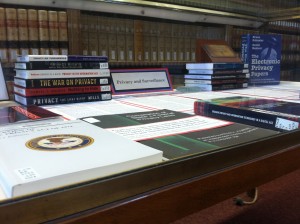Carrel signups will be next Tuesday and Wednesday, September 3 and 4. Carrels located on the first, fourth, new ground, and basement floors may be reserved for one semester at a time by 2Ls, 3Ls, LLMs, and exchange students. Carrels located on the second floor may not be reserved and are available daily on a first-come, first served basis. All carrels are numbered. A carrel map will be made available with the signup form for easy identification. Each carrel must be shared by two students. Students may select a carrel partner or choose to have the library assign one.
Students may reserve carrels in person at the Law Library on a first-come, first-served basis. The signup period will span two days:
- Tuesday, September 3: Reserved for students who are serving on journals, moot courts, or working for a professor.
- Wednesday, September 4: For the remainder of the students identified above.
Please see Janet Gillespie in room 352 between the hours of 8am-12pm and 1pm-5pm on the appropriate day. Questions may be directed to Janet at jmg32@cornell.edu or 607-255-5854.





